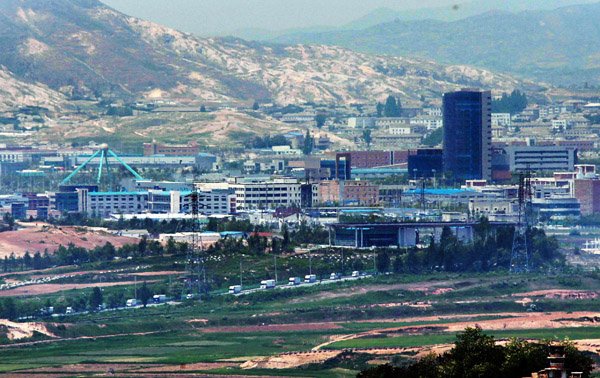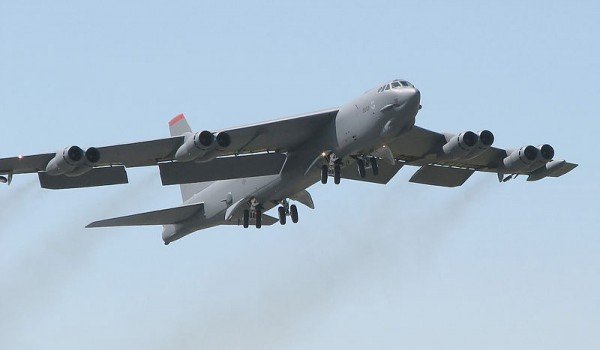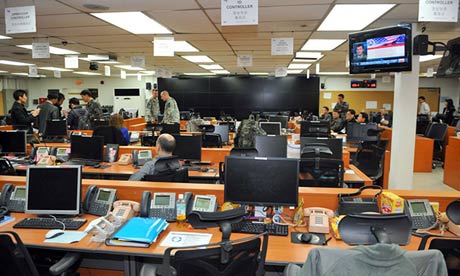Home Tags Posts tagged with "korean war armistice"
korean war armistice
Kaesong Industrial Complex at the North-South Korea border is still operating despite Pyongyang cutting a military hotline with South Korea on Wednesday.
The hotline had been used mainly to facilitate cross-border travel at the Kaesong Industrial Complex for South Korean workers.
It was the last direct official link between the two nations.
Pyongyang has been angered by US-South Korea military drills, and the fresh UN sanctions that followed its third nuclear test in February.

Kaesong Industrial Complex at the North-South Korea border is still operating despite Pyongyang cutting a military hotline with South Korea
In recent weeks North Korea has made multiple threats against both the US and South Korea, including warning of a “pre-emptive nuclear strike” on the US and the scrapping of the Korean War armistice.
North Korea is not thought to have the technology to strike the US mainland with either a nuclear weapon or a ballistic missile, but it is capable of targeting some US military bases in Asia with its mid-range missiles.
More than 160 South Korean commuters went through border control on Thursday morning to start work at the complex, after being approved for entry by North Korea, officials said.
North Korean authorities had used a civilian phone line to arrange the crossing, they added.
Over 500 South Koreans are scheduled to cross the border in Kaesong in Thursday.
“We say that Kaesong industrial complex will go on running, even if the war breaks out. I don’t feel so nervous,” Jang Seon-woo, a South Korean worker, told AP news agency.
The joint project in Kesong, which was established as a sign of North-South co-operation, is a source of badly-needed hard currency for the North.
Around 120 South Korean firms operate at Kaesong industrial park, employing an estimated 50,000 North Korean workers.
There have been disputes and the North Koreans have, on occasion, blocked access across the Demilitarized Zone that divides the two Koreas, who remain technically at war.
North Korea has already cut both a Red Cross hotline and another line used to communicate with the UN Command at Panmunjom in the demilitarized zone.
An inter-Korean air-traffic hotline still exists between the two sides, according to reports.
Meanwhile, in a phone call on Wednesday, US Defense Secretary Chuck Hagel told his South Korean counterpart Kim Kwan-Jin that the US would provide “unwavering” support to South Korea.
Chuck Hagel also told his South Korean counterpart that the US-South Korea alliance was “instrumental in maintaining stability on the Korean peninsula,” Pentagon spokesman George Little said in a statement.
On Tuesday, North Korea said it had ordered artillery and rocket units into “combat posture” to prepare to target US bases in Hawaii, Guam and the US mainland.
In a statement on Wednesday, North Korea’s official news agency KCNA also said that North Korea’s air force was ready to “wipe out” US military bases in Guam.
However, Guam Governor Eddie Baza Calvo described an attack as “unlikely” and urged residents not to let the threats “distract from [their] day-to-day lives”.
[youtube FwdaTCe9zmY]
South Korea and the United States have signed a new military plan to counter what officials call North Korean “provocations”.
The plan provides for a joint response between South Korea and the US in the event of an incursion or a limited attack from North Korea, officials say.
Help from the US – which has 28,000 troops in South Korea – during minor skirmishes was previously optional.
Regional tension remains high after the North’s third nuclear test last month.
The US already offers South Korea a “nuclear umbrella”, but Cold War experts have pointed out that while nuclear deterrence may address the possibility of all-out war, it does not deter low-level incidents.

South Korea and the US have signed a new military plan to counter what officials call North Korean provocations
Under the new plan, South Korea will be able to call on US assistance should Pyongyang follow through with its recent threats, for example to attack remote South Korean islands.
“This allows both nations to jointly respond to the North’s local provocations, with the South taking the lead and the US in support,” South Korean defence ministry spokesman Kim Min-seok said on Monday.
“It will have the effect of preventing the North from daring to provoke us,” he added of the deal, which was signed on Friday.
The “provocative” acts that the plan seeks to address include incursions on the border and by low-flying aircraft, and attacks on border islands.
The new plan was conceived in 2010, after North Korea shelled a border island. A South Korean warship also sank that year, leaving 46 sailors dead. South Korea said North Korea torpedoed the ship, but Pyongyang denied this.
Last month the UN imposed fresh sanctions against North Korea following its nuclear test on February 12.
Pyongyang has responded with escalating rhetoric both to this and US-South Korea joint military drills which it bitterly opposes.
North Korea says it has scrapped the Korean War armistice and ended non-aggression pacts with Seoul.
South Korea says North Korea cannot unilaterally dissolve the armistice and has called on Pyongyang to tone down its language.
[youtube k4JstBdOsgk]
The US is flying nuclear-capable B-52 bombers over South Korea, in what it says is a response to escalating North Korean rhetoric.
US officials said the B-52 flights demonstrated “extended deterrence capabilities” amid rising tension on the peninsula.
B-52, which can also carry conventional weapons, flew on March 8, with another mission set for Tuesday.
Regional tension remains high following North’s third nuclear test last month.
This is not the first time that B-52 bombers have been used as part of regular military drills between the US and South Korea.
“We’re drawing attention to the fact that we have extended deterrence capabilities that we believe are important to demonstrate in the wake of recent North Korean rhetoric,” Pentagon press secretary George Little said.
“As North Korea threatened to attack South Korea with nuclear weapons, the exercise involving B-52s is meaningful, as it shows US commitment to provide its nuclear umbrella on the Korean peninsula,” said Kim Min-seok, spokesman for South Korea’s Defence Ministry.
US Deputy Defence Secretary Ashton Carter affirmed this commitment on Monday during a visit to Seoul.
The US last week also announced plans to boost its own missile defences in the face of a growing threat from North Korea, a move over which both China and Russia have expressed concern.

The US is flying nuclear-capable B-52 bombers over South Korea, in what it says is a response to escalating North Korean rhetoric
A spokesman for China’s Foreign Ministry said it would “intensify antagonism”, rather than improving regional stability.The UN imposed fresh sanctions against North Korea following its nuclear test on February 12.
Pyongyang has responded with strong rhetoric to this and the US-South Korea joint military drills, which it bitterly opposes.
It says it has scrapped the Korean War armistice and ended non-aggression pacts with Seoul. It has also cut off a hotline that connects the two countries.
The two Koreas remain technically at war because the 1950-53 conflict ended in an armistice, not a treaty.
South Korea says North Korea cannot unilaterally dissolve the armistice and has called on Pyongyang to tone down its language.
South Korean President Park Geun-hye on Tuesday called for North Korea to take a different approach.
“North Korea is wasting resources for nuclear development while its people are living very difficult lives,” she said.
North Korea has accused the United States and its allies of attacks on its internet servers, amid tension on Korean peninsula.
KCNA news agency said the “intensive and persistent” attacks coincided with US-South Korea military drills.
Official sites such as KCNA, Air Koryo and Rodong Sinmun, the party newspaper, are reported to have been inaccessible on some occasions in recent days.
Tension has escalated in the wake of North Korea’s third nuclear test last month.
The test led to fresh UN sanctions being imposed on Pyongyang, which has responded with strong rhetoric – both to the UN move and the annual joint drills, which it bitterly opposes.
It says it has scrapped the Korean War armistice and ended non-aggression pacts with Seoul. It has also cut off a hotline that connects the two countries.
The two Koreas remain technically at war because the 1950-53 conflict ended in an armistice, not a treaty. South Korea says North Korea cannot unilaterally dissolve the armistice and has called on Pyongyang to tone down its language.
North Korea called the cyber attack a “cowardly and despicable act”.
“It is nobody’s secret that the US and South Korean puppet regime are massively bolstering up cyber forces in a bid to intensify the subversive activities and sabotages against the DPRK [North Korea],” KCNA said.

North Korea has accused the US and South Korea of attacks on its internet servers
However, accusations of cyber attacks on the peninsula usually flow in the opposite direction.South Korean intelligence sources say North Korea routinely attempts to access the network here, and Pyongyang is believed to have broken into Defence Ministry data at least once in the past few years, our correspondent adds.
Current internet access in North Korea is extremely limited for locals, with most people only having access to a small number of state-run pages. The wider internet is available only to the government and the military.




